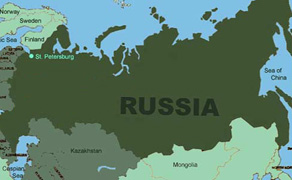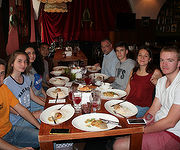Information
Saint Petersburg was founded in 1703 by Peter the Great, who wanted to establish a new capital outside Moscow (a city which he greatly disliked), from where he could exert more influence over Europe. The Northern marshland that became St. Petersburg proved a perfect spot, perched aside the Baltic Sea and overlooking Scandinavia from where Peter could more easily do battle with the Swedes, Danes and Finns - Russia's principal enemies at the time. The flat land astride the River Neva also enabled Peter and his successors to build a city of incredible beauty, characterised by long boulevards, picturesque canals and bridges as well as numerous grand palaces. Although most of St. Petersburg could do with a fresh lick of paint, the scope and splendour of the Tsar's ideal capital remain.
For over two hundred years Saint Petersburg remained the capital of Russia, from where the Tsars lived and ruled, from Peter I up to Nicholas II. In 1917 however the Tsars were overthrown in the Russian Revolution, and the Bolsheviks, led by one Vladimir Ilyich Lenin, seized power. In the subsequent Civil War, Lenin was forced to retreat to Moscow which later reclaimed its status as Russia's capital. By then 'Sankt Petersburg', as it had been known since 1703, had already had its name changed to Petrograd (after World War I broke out the original title was considered too German). When Lenin died in 1924 the city's name was changed once more to Leningrad - and the dimunitively-statured father of socialism ousted the giant Tsar from the town he had founded.
Leningrad remained the city's name when it endured a three year siege during World War II. However, a vote in 1990, just after the fall of Communism, narrowly returned the original title of St. Petersburg. Despite no longer being the capital, St. Petersburg is often referred to as the head of Russia (with Moscow being the heart), because of its size and importance to the country, it's northerly position, and its prominence in the world of culture and the arts. It is the home to 4.7 million people (3 percent of the country's total population), and it is the most northerly city in the world, with a population of over a million. Its city centre is a listed UNESCO heritage site, and it has produced the Kirov Ballet, Tchaikovsky, Dostoevsky, Nabakov and more recently famous rock bands Aquarium, Kino, Dva Samoleta and Tequilajazz.
 Population: 142 million
Capital: Moscow
Major language: Russian
Major religion: Islam, Christianity
Life expectancy: 61 years (men), 73 years (women)
Monetary unit: 1 rouble = 100 kopecks
Main exports: Oil and oil products, natural gas, wood and wood products, metals, chemicals, weapons and military equipment
Average annual income: US $2,610
Internet domain: .ru
International dialling code: +7
Population: 142 million
Capital: Moscow
Major language: Russian
Major religion: Islam, Christianity
Life expectancy: 61 years (men), 73 years (women)
Monetary unit: 1 rouble = 100 kopecks
Main exports: Oil and oil products, natural gas, wood and wood products, metals, chemicals, weapons and military equipment
Average annual income: US $2,610
Internet domain: .ru
International dialling code: +7
About St. Petersburg
The Russian Federation is a country that stretches over a vast expanse of Europe and Asia. With an area of 17,075,400 kilometres squared (6,595,600 miles squared), it is the largest country in the world, covering almost twice the territory of the second largest nation, Canada. Despite its great size, Russia is sparsely populated, and much of its expanse constitutes vast tracts of forest, grasslands and tundra. It has only the eighth highest population in the world.
The Russian Federation has existed since 1991, during which year the The Union of Soviet Socialist Republics (USSR) was dissolved after nearly 70 years of power. Russia became the largest of fifteen segregated states, but it has since struggled to rebuild the power and influence it held as the head of the Soviet Union.
During Soviet times Russia enjoyed the position of one of the world's two great superpowers, owing largely to Stalin's ambitious drive towards industrialisation (at the cost of millions of lives in slave labour) and wealth accumulated after the victory over Germany in the Second World War. Later, under Brezhnev, the USSR continued to prosper as Soviet patriotism saw the Russians competing with the USA in the arms and space races. Perhaps this is why these times are still referred to by many ageing Russians as a golden age in their history. However, the corruption that plagued the Soviet regime, and the incompatability of communism and consumerism, meant that - despite several attempts to restructure and reform - the regime collapsed amidst a number of political wrangles.
It was President Yeltsin who eventually emerged victorious, defying several coups and declaring The Communist Party illegal. Russia has since enjoyed an uneasy and politically unstable ride from a Socialist central economy to a Capitalist system. Whereas many have amassed untold wealth, many more - particularly from poorer communities - have seen their living standards decrease.
Today, President Putin has brought increased political and economic stability to Russia. However his government has increased state control of the media, and questions from the international community have been raised about his record on human rights in Russia.
Comments
I really like the information on here its helping with my project for school but i would like if someone would put the climate of St. Petersburg from the past 10 years in here !:)
ReplyNo comment to make but what feedback on best time to visit St Petersburg did you get. I would alos like that info, especially which month has the least rain
Replyi was trying to find what the climate is like at st. petersburg. The good season for visiting, and weather of whole year in general.. what it's alike ??? If anybody can drop some info..!!!
ReplyChristianity is the first russian religion. Islam is second. Islamic is over 10% of population of Russia.
Reply
 EDUCA Russian Language Center
EDUCA Russian Language Center
 Underwood Art Hotel
Underwood Art Hotel